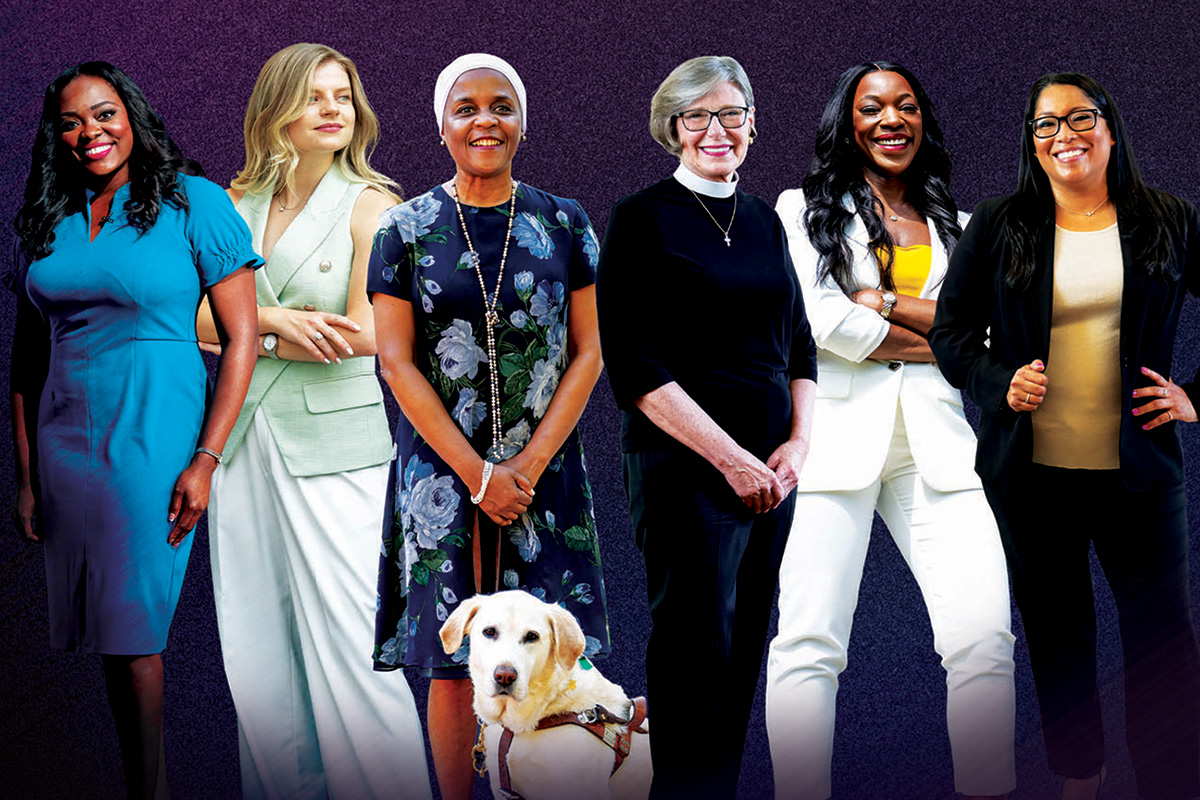Cynthia Bryant
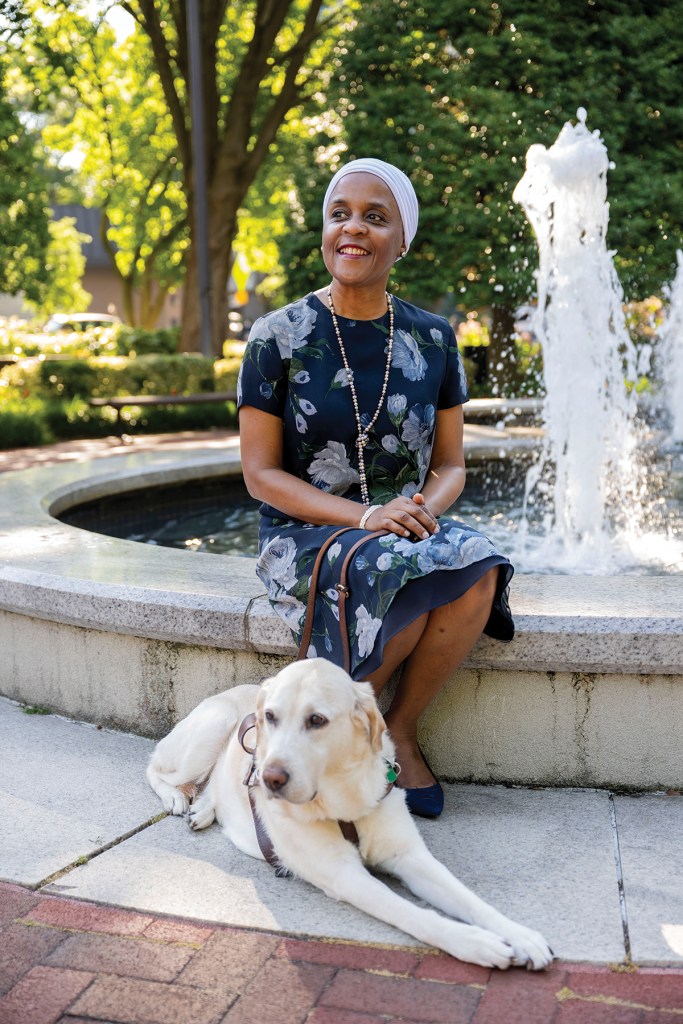
At 14, Cynthia Bryant was in the waiting room of a Kansas City, Missouri, hospital. Her mother, a philanthropist, and father, an internal medicine doctor, had been taking her to eye specialists across the Midwest, concerned about her peripheral vision. On that day, her mother was consulting yet another physician.
Suddently, a hospital social worker sidled up to the teenager with brochures about welfare and other government support programs. Just as the woman began telling her that she would need these services someday, Cynthia’s mother appeared and shooed the social worker away. There would be no talk of government assistance, her mother told her, and no matter what lay ahead, she would grow up to accomplish whatever goals she set for herself.
Not long after, Cynthia learned her diagnosis: a rare genetic condition called retinitis pigmentosa (RP). The disease slowly breaks down cells in the retina until all you can see are shadows of light. Having RP, she was told, meant that she’d eventually go blind.
Now 61, Bryant is a professional mediator and chairs the board of trustees of The Seeing Eye, a nonprofit based in Morristown, New Jersey, that is the oldest existing guide dog school in the world, according to its website.
Bryant enrolled in the program in her 40s, two decades after she’d been declared legally blind and several years after she’d begun using a cane. She’s the first graduate of Seeing Eye to serve as board chair in the organization’s 95-year history. She’s also the first person of color to serve in the role, as well as the first woman to assume the chairmanship since Dorothy Harrison Eustis, who co-founded the organization in 1929.
Bryant is also a sought-after public speaker who uses the tools she honed over her 23 years as an attorney with the Federal Communications Commission (FCC), and the skills she’s perfected as a negotiator—both during her time at the FCC and since her retirement in 2022. Now her goal is to “build a bridge,” she says, between the sighted and the sightless, the Black community and white, and those who share disparate worldviews.
Her empathy speeches, as she calls them, conclude with “sensory mindfulness walks,” which aren’t walks at all, but almost poetic renditions of her typical morning stroll. She explains that 80% to 85% of what sighted people take in around them is through their eyes, and they are missing out on the joys that their other senses offer.
Bryant has given variations of her speech via Zoom to audiences around the world, as well as in person in South Korea, throughout the U.S. and in venues closer to her Chevy Chase home. Her guide dog, Summer, a 9-year-old yellow Labrador retriever mix, is always with her. It’s Summer who gives her the freedom to walk with confidence, Bryant says. It’s Summer who sits at her feet as she delivers her speeches.
“It’s a cold wet morning; I can feel the dampness on my skin,” her “walks” often begin. She goes on to detail her journey from her townhouse in Chevy Chase to the Friendship Heights Metro station, including the scent of her favorite tree in bloom, the sounds of the “symphony of birds,” and noticing how the coos of doves and the drumming of woodpeckers give way to the whoosh of rushing cars and the crunch of shoes on roadway gravel.
A native of Kansas City, Bryant relocated to Washington, D.C., at 37, when she could no longer see at night, because the city had public transportation and the Kennedy Center, and she knew she needed both, she says. She’d studied both music and French as an undergraduate and had grown up playing three instruments and watching the Kennedy Center Honors on television. By the time her vision had deteriorated enough to enroll in The Seeing Eye, she had already worked as a preschool teacher outside Boston, attended the University of Kansas School of Law, and served as an attorney with the Missouri Public Service Commission.
“She has a beautiful voice, and she has perfect pitch,” says Bryant’s friend Carrie Clark, who adds that at the end of Bryant’s speeches she’ll often “pick a song that has to do with [what] she’s spoken about, or something that she thinks will inspire people, and she’ll just sing the song.”
Bryant realized her gift of bringing people together during her early years at the FCC. She was representing Native American tribes in complaints against telecommunication carriers. It was so rewarding to get the two sides talking that she soon signed up for classes through the Harvard Negotiation Institute, entered a leadership program through Blacks in Government, and flew to Georgia to interview former President Jimmy Carter about his negotiating strategies during the Camp David Accords.
Now she encourages people not to focus so much on what they see with their eyes; it can drive people apart. Instead, she says it’s important to consider where others are coming from and, figuratively, to walk in their shoes. “The only way to master the story,” she says, “is to get back to interaction through our other senses.”
Simona Cabana
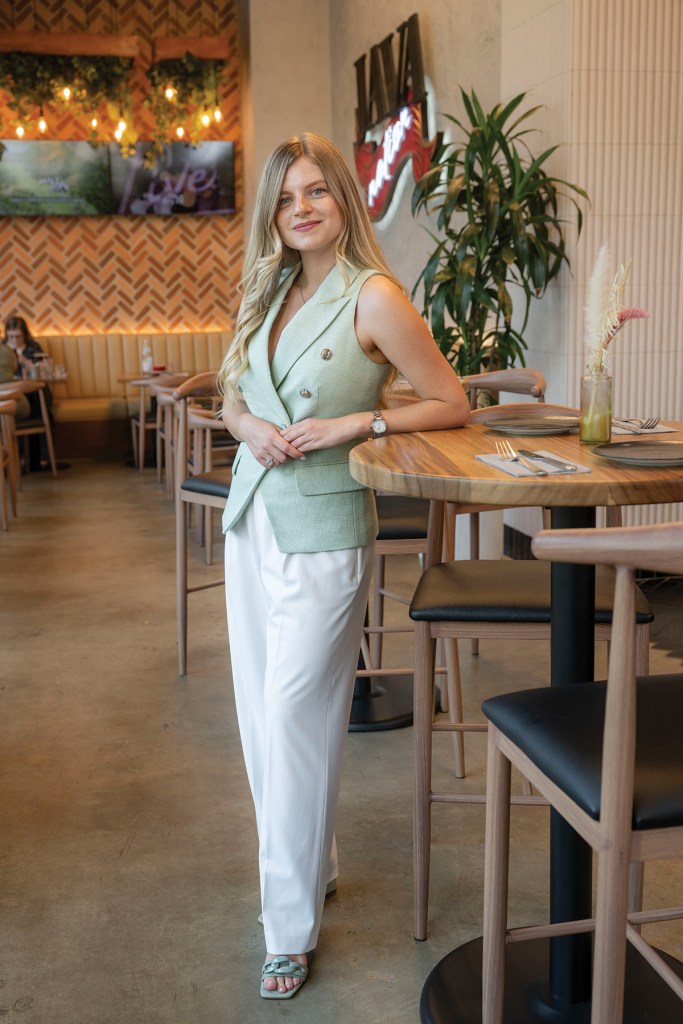
Simona Cabana will never forget how she spent her first month in the U.S.—hiding behind the counter of the first and only Java Nation coffee shop and watching as the small staff interacted with the few patrons who walked through the door.
It was 2016, and Cabana was 20 years old and newly married. She’d just arrived from her home country of Belarus and spoke broken English. Her husband, Henry, a general contractor, had built out the Kensington shop four years earlier and hired a manager to run the place, but it hadn’t turned a profit. Henry was about to sell the business to a man who wanted to turn it into a Mexican restaurant—that was, unless his new wife wanted to take a crack at running it.
She did, she told him. But first she had to learn the language, study what the business was doing wrong, and figure out how to do it better.
Fast forward to today. Cabana, now 28, is president and CEO of a local coffee and restaurant empire. She’s grown Java Nation to include four locations—in North Bethesda, Kensington, Silver Spring and Gaithersburg—plus a commissary in North Bethesda and a roastery in Frederick. Her staff now numbers more than 130, she says, and includes both an executive chef and a pastry chef who create an extensive menu of cocktails, salads, entrees, desserts and breakfast pastries that are trucked daily to each restaurant. This year, she says, Java Nation sales are expected to exceed $10 million.
Many of Cabana’s original employees have moved into leadership roles. A few had ties to small coffee farms in their home countries, and Java Nation, with Cabana at the helm, has provided equipment so these farms can grow the high-end beans used in Java Nation’s specialty brews. The company has even supported the villages where they are located, Cabana says, donating funds to one town after it was hit by landslides, and computers and uniforms to local orphanages.
“She made all the good changes,” says Java Nation District Manager Karla Hernandez, who was one of only five employees at the Kensington store when Cabana arrived. “To be honest, we were having issues,” Hernandez says, but then Cabana took over and followed through on nearly every suggestion offered by customers, including the addition of new menu items Cabana created, changing the coffee supplier, and eventually roasting her own beans in the back of the store, Hernandez says.
Cabana left her family home at 17 to move to Belarus’ capital city of Minsk, where she spent her days at the public library studying business strategies of successful entrepreneurs. While also freelancing as a graphic designer, a client introduced her to her future husband, who was in the U.S. and needed help with social media and menu design for his startup coffee venture. There was chemistry from the start, Cabana says, and soon Henry flew to Belarus to meet her and her family. He ended up proposing on the trip, and the two have been together since.
Cabana says she had to make the store a success because “it [was] already like part of our little family.”
Right away “I became the barista, dishwasher, executive chef, food and beverage director. … I’d take a shift, I would put myself in a schedule, work in the back and the front, opening, closing … and when everyone was gone, I’d stay and roast until 9, 10 p.m.,” she says. “I took the sales like from $200 a day to $600 … and from $1,200 to $2,400. And it basically started skyrocketing.”
Today, videos on large-screen monitors run at every Java Nation restaurant, showing the farms where it gets its specialty beans, and occasionally Cabana strolling through the fields with a farmhand or foreman. She likes the way the films help bring customer awareness to the coffee-growing process.
Still, the Kensington resident isn’t resting on Java Nation’s laurels. She’d like to start offering classes to customers—instructing them on different blends and roasting techniques—as well as entering Java Nation’s proprietary coffee in national and international competitions. And she’d like to do more to help small coffee farmers around the world. Later this fall she will visit several small farms in El Salvador.
“When you are a young CEO, I think you have … to stay humble about what [you] know [or] don’t know,” she says. “I never stop learning, never stop educating myself, never stop trying to explore new things.”
Anne Derse

It’s a Sunday morning in May, and the Rev. Anne Derse, 70, is standing before about 150 parishioners at St. John’s Norwood Episcopal Church in Chevy Chase. Tall and elegant, wearing a long white robe and an embroidered stole, she holds a leather-bound red and gold Gospel book high over her head, then cradles it in her arms to locate the page she wants, and begins reading from the Gospel of Mark in a voice that’s strong and clear—honed from years of public speaking in English, as well as French, Italian, Azerbaijani and Lithuanian.
For more than 30 years, Derse was a U.S. diplomat and Foreign Service officer. She served as ambassador to Azerbaijan under Presidents George W. Bush and Barack Obama, and ambassador to Lithuania under President Obama. During her tenure in that Baltic nation, she was instrumental in encouraging the Lithuanian government to criminalize domestic violence against women, promoting LGBTQ+ and other human rights issues, and lobbying the political leadership to address the tragic legacy of the Holocaust in Lithuania.
Largely due to her efforts, Lithuania passed a historic restitution bill, awarding millions of dollars for Jewish property that had been seized by the Nazi government in Lithuania. It was only the third European country, after Germany and Austria, to pass such a bill. A “door is opening, and an awareness is gradually replacing ignorance,” she told a Lithuanian news outlet at the time.
Derse was also among a small group of diplomats who established the new U.S. Embassy in Baghdad and she served as the final U.S. commissioner on the Tripartite Gold Commission in Belgium, working with colleagues from the United Kingdom and France to adjudicate claims of gold stolen by Adolf Hitler’s Germany from central banks across Europe. Even her roles closer to home were impactful. From 2005-2006, she served as director for biodefense policy at the Homeland Security Council at the White House under George W. Bush, helping to write the President’s Plan for Fighting Pandemic Influenza. “It was a darn good plan,” she says. “And of course, when [President Donald] Trump came in, he threw it out.”
Derse retired from the State Department in 2012 and in 2016 she returned to school to become a deacon in the Episcopal Church. She was ordained in 2018 at the age of 64.
The Bethesda resident has since become a passionate proponent of interfaith engagement and cooperation among religious groups that call Montgomery County home. As St. John’s Norwood’s minister for community engagement, she has led multifaith vigils—for gun-violence prevention, victims of COVID-19, and most recently for peace and humanity, where she welcomed faith leaders from across the spectrum in offering prayers and words of solace that were intentionally nonpolitical. She’s a regular at rallies and other events in support of any group whose basic human rights are being threatened.
Derse has also been the impetus for projects helping asylum-seeking families from Afghanistan, Africa and the Middle East settle in the county and for establishing Nourishing Bethesda, a food distribution nonprofit that feeds nearly 5,000 people each month.
“She’s mesmerizing,” says longtime friend and colleague Nancy Adams, a retired U.S. government trade negotiator who has known Derse since the 1990s, when Derse and her husband, Hank, were stationed in Asia with their four young children. “She’s got such a skill from her years in diplomacy … she’s a motivator [who] helps people recognize what they can achieve together,” Adams says. “When she speaks … it’s just with such a sense of authority, [yet] it’s not dictative, it’s really inspirational.”
Derse says it wasn’t such a stretch to go from career diplomat to church deacon and community leader. Even during her time in the Foreign Service, she says, “the things that touched my heart were the things that helped change people’s lives. … It was the human stuff that spoke to me.”
Still, her second career came to her as an epiphany. A few years after she returned from her final overseas assignment, she was idling in her car at a red light at the intersection of Bethesda’s Bradley Boulevard and Wisconsin Avenue and thinking, What am I going to do with the rest of my life? Then she looked up and saw the tower of St. John’s.
She pulled into the parking lot and went inside to see if the priest happened to be there. He was. “You could say it was impulsive, you could say it was a spur of the moment,” Derse says. “Or you could say I was guided to do that.”
Marissa Mitchell

Marissa Mitchell knew at the age of 9 that she wanted to be a journalist. “Unlike other kids that age, I didn’t run home and watch cartoons. I watched my local news and The Oprah Winfrey Show,” she says. “I wanted to be just like those women on television who delivered information that mattered.”
Today the four-time Emmy Award-winning journalist is FOX 5 DC’s main morning anchor and co-host of the news and lifestyle show Good Day DC. She’s also one of the most altruistic on-air personalities in the Washington, D.C., area, donating hundreds of her off-duty hours to charitable causes, from women’s empowerment to raising awareness for missing Black youths “who don’t get the on-air coverage that they deserve,” she says.
Mitchell, 39, arrived in the D.C. area in September 2020 from the Fox affiliate in Atlanta and was recruited almost immediately to emcee online charitable functions and lend her presence at 5K and 10K runs. “I do have a bubbly personality … and I think it really stood out at a time [when] people needed to feel special and [be] seen and heard,” she says, referring to the COVID-19 crisis.
As lockdowns ended, requests for her time only grew. Then and now, the Silver Spring resident has continued to offer a resounding yes to nearly every appeal. “It was just a natural connection that just happened,” she says.
Among the first to reach out was philanthropist, motivational speaker and entrepreneur Tasheka Green. Weeks after seeing Mitchell on-air for the first time, Green emailed her to ask if she’d emcee the Deborah C. Offer Bulgin Memorial Foundation’s annual gala, named in memory of Green’s mother, who died of stomach cancer at the age of 53. The gala was being held online that year due to the pandemic. “I was just drawn to [Mitchell’s] passion. … I saw so much love, so much life, so much purpose in her,” Green says.
Green shared with Mitchell that the foundation awards a scholarship at the gala to a woman who has improved the lives of others so that she can continue with her professional education. “I shared the context and background … and [Mitchell] was like, ‘What a great way to honor and celebrate your mom’s legacy, by awarding women who give back to their community. … I would love to be a part,’ ” Green recalls.
Since then, Mitchell has participated in hundreds of events, from Prince George’s County’s Dancing With the Stars (raising thousands of dollars to fight domestic violence) to gatherings in support of the arts in D.C.’s Anacostia neighborhood to events here in Montgomery County. “She’s not just this distinguished journalist and media personality, but she [is] someone who exemplifies virtues of resilience and grace and determination,” Green says. “She always wants to shine the light on [other] people.”
Mitchell got her journalistic start as a teenager in Atlanta, co-hosting her high school’s televised morning news show, the same show anchored by television personality Ryan Seacrest a decade earlier. When it was time for college, she was offered a full-tuition scholarship to Emory University, not far from her home, where she majored in journalism and political science. After graduation and a couple of advertising and newspaper jobs in Atlanta, she was awarded another full-tuition scholarship, this time from the McCormick Foundation, to Northwestern University’s Medill School of Journalism in Evanston, Illinois, where she earned her master’s degree.
On-air reporting jobs followed: Chattanooga, Tennessee; then in Birmingham, Alabama; and later at Fox 5 in Atlanta, where she stayed for four and a half years before being offered a full-time anchor position in D.C.
Over the course of her career, she’s covered events from the 50th anniversary of the civil rights march on Selma to the 60th anniversary of the March on Washington. She has interviewed celebrities from Oprah Winfrey to Clint Eastwood to wellness guru Deepak Chopra. Many of her stories have earned national recognition, including her celebrity-filled tribute to the late “Queen of Soul” Aretha Franklin, which earned her a Salute to Excellence Award from the National Association of Black Journalists. She’s also been inducted into Emory’s Hall of Fame, and its 40 Under 40, which “celebrates young alumni who represent the very best in achievement and service,” according to the university.
The stories that mean the most to her, though, are those that show how regular people can inspire others, she says. This summer she won a Capital Emmy award for a discussion series she produced and hosted on mental health awareness, and earlier this year she introduced the weekly Fox 5 feature Motivation with Marissa, where she profiles local women who have overcome tremendous odds. She brought the idea to fruition “in hopes that [their] stories will inspire and empower others,” she says. “To develop trust and to be effective, you have to be a part of the community that you report on, and you should want to be.”
Karyn Onyeneho
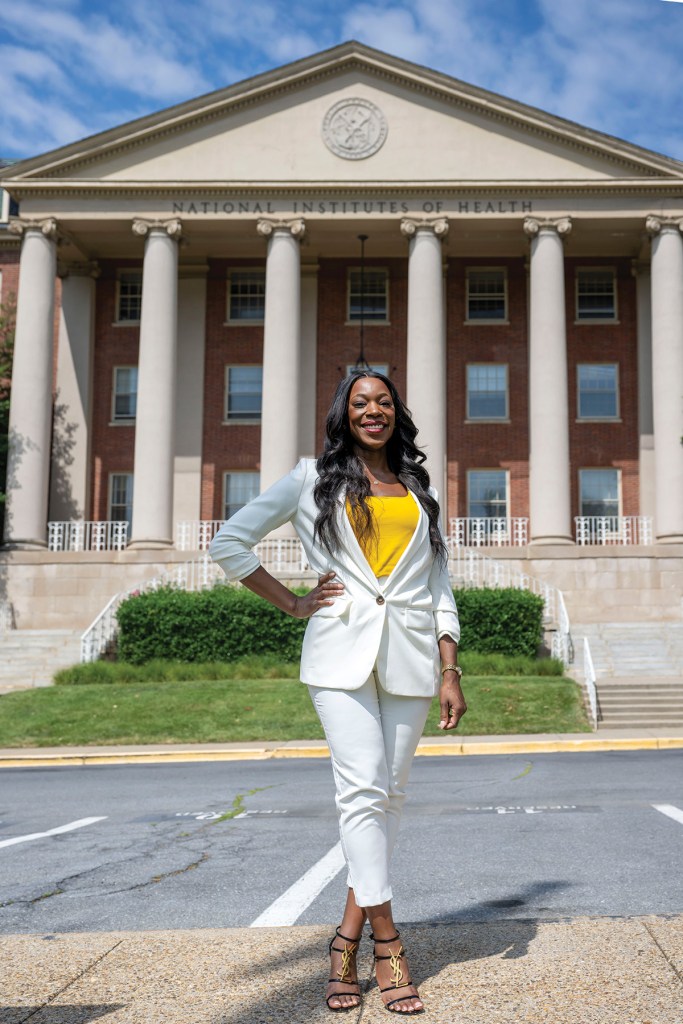
It was 2014, and Karyn Onyeneho was feeling overwhelmed. “I remember in the parking lot walking to my car in the rain,” she recalls. “I didn’t even want to put up my umbrella. I was like, I don’t know if I can do this.”
At the time, she was holding down a full-time, high-security clearance position with the U.S. Department of Homeland Security and driving almost daily from Silver Spring to George Mason University in Fairfax, Virginia, to earn her master’s degree in health informatics, a three-year program she was determined to complete in one year. She’d already graduated magna cum laude from Howard University, earning a bachelor’s degree in health sciences and management on a full scholarship in half the time of most students.
“I know, it’s crazy … but I do thrive in challenging situations,” says Onyeneho, who went on to earn her Ph.D. from Howard in nutritional sciences in 2022, graduating at the top of her class while working full time at the National Institutes of Health (NIH) in Bethesda.
Now 41 and living in Burtonsville, Onyeneho is one of the nation’s leaders in the fields of human genetics and experimental nutrition. The first in her family to earn a Ph.D., she is senior advisor for federal policy on genomic data sharing and chair of the Data Access Committee at NIH’s National Institute on Aging (NIA).
It’s a complicated title, as many of hers have been. Suffice it to say she’s spent much of her adult life focused on improving the health outcomes of people from every walk of life.
Long before she became a geneticist and nutrition scientist, it was clear that she was going to make an impact, says her mentor, Charles Kenny, who taught her early on at Prince George’s Community College. Even then, he says, “She was leaps and bounds beyond the other students in the class.”
For the past 10 years, Onyeneho’s focus has been on the BIPOC community, which includes Black people, indigenous populations and people of color. She got her motivation after her dad’s mother died of Type 2 diabetes and hadn’t been well enough in her later years to travel from her native Nigeria to the U.S. for treatments. Her mom’s father succumbed to the same disease years earlier.
Onyeneho, a first-generation Nigerian American, started investigating the genetic determinants of Type 2 diabetes in adults of African ancestry and the expressed genes that contribute to the disease. “I realized, wow, so this is a disease that impacts many people, particularly people of color … we actually are born with genes that predispose us to this disease,” she says. “That’s really what led me to want to continue to stay in the space of genomics.”
After raising money through GoFundMe to travel to Botswana as a doctoral candidate to compare dietary patterns of African and African American adults as risk factors for Type 2 diabetes, she took a job in 2018 with NIH’s All of Us Research Program, a historic initiative focused on treating every individual using precision medicine. As she moved into leadership roles at NIH, she found herself frustrated that there weren’t more resources or nutritional interventions tailored to people of color.
On her own, she founded a website, Color of Genes, that continues to gain traction in the field. She hopes it one day will serve as a digital health directory for people across the BIPOC community to connect with BIPOC providers who can help them understand their genetic disease predisposition to diabetes and other diseases, and can address cultural and language barriers that create obstacles to appropriate care.
“I thought, well, what if I were to develop an informational web page that … sheds light on … what is genomics, what is genetic research … why is the field limited in representation across different racial and ethnic groups, [and] how can we bridge that gap.”
For example, she says, “My grandmother … didn’t speak fluent English. It would [have been] great if … she could have had a provider that … [spoke] Igbo [a language spoken in southeastern Nigeria.]”
Profiled in Glamour magazine as one of its 2022 College Women of the Year, Onyeneho called herself a maverick for change. She still sees herself that way. As a woman and a Nigerian American, “I’m like a unicorn in the genomic space,” she says.
“There are … not a lot of … people of color who are … geneticists or even genetic counselors,” she adds, and that means there are too few people in the field who understand the cultural values that make certain communities hesitant to join clinical trials or donate blood for genomic analysis. If we better understood these communities’ cultural beliefs, perhaps we could better engage these communities, she says.
“I lost two grandparents to the same disease on different sides of my family. … If not for anything, maybe I can save someone else’s grandpa or grandma.”
Rosario ‘Paola’ Velasquez
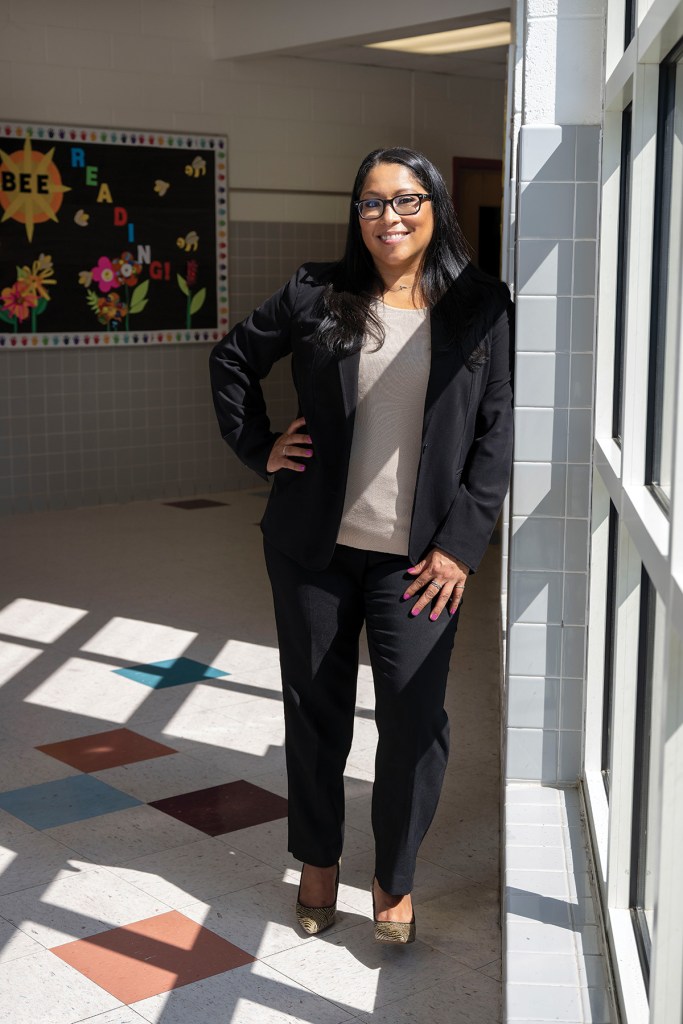
As soon as Paola Velasquez opens the classroom door, a swarm of kindergartners drape their arms around her in a tight embrace. Little girls with box braids and pigtails, little boys with cornrows and close-cropped Afros—some with shy smiles, others with excited laughs—they quickly pile on, and the hug circle around their principal grows bigger and bigger. The same thing happens in nearly every classroom she enters.
It’s been five years since Velasquez, 44, took over the reins of Jackson Road Elementary School in Silver Spring’s White Oak neighborhood. It’s a Title 1 school with a minority population of more than 95%, where more than 75% of the students qualify for free meals. She started in the role only months before the pandemic hit. Since she’s been at the helm, the school rose from a 3-star rating to a 4-star, according to the Maryland State Department of Education, making it one of only four Title 1 elementary schools in the county (out of 40, according to Velasquez) to earn a 4-star rating for the 2022-23 school year, the most current rating year available. “Many schools throughout the state decreased a star, but we increased,” she says.
The school now offers free evening English language classes for parents and guardians (along with free child care); a soccer program; two private-practice therapists who administer one-on-one mental health services to students at no charge; a dentist who cleans students’ teeth for free; and an optometrist who provides complimentary vision checks and eyeglasses, says Chris Callisto, Jackson Road’s Community School Liaison.
During the 2023-24 school year, Jackson Road opened a food pantry, and it began sending bags of food home on Fridays to 80 families. “When you are a child … and your basic needs aren’t being met because of poverty, you’re not thinking so much about going to college … you’re more worried about getting something to eat or clothing or making sure that you’re not going to be homeless,” Velasquez says.
Velasquez knows what it’s like to grow up poor in Montgomery County. She came here from Peru with her parents and three brothers when she was 8. All six lived in the basement of a relative’s house in Germantown while her dad worked as a janitor and painter, and her mom cleaned houses. Her parents saved enough money to move into an apartment, and eventually to buy a small home in Germantown.
When Velasquez graduated from Seneca Valley High School in Germantown in 1998, she watched as other students went off to college. She hadn’t been instructed how to sign up for SATs, fill out college applications or plan for her future. Instead, she took a job as an aide at a day care center, saved money to buy a car, then to pay for classes at Montgomery College, and then to earn her bachelor’s degree in elementary education at the University of Maryland, College Park.
While working as a second grade teacher at Whetstone Elementary School in Gaithersburg, she took evening classes to earn her master’s degree in educational leadership and administration, and was propelled toward the principal track, she says, by something one of her professors, a retired MCPS principal, told her: When you have a classroom of 26 or 27 kids, you can impact that many students a year; when you are a principal, you can impact an entire school’s worth of students.
She worked at Weller Road Elementary School in Silver Spring and at Jackson Road, before being named the assistant principal at Germantown’s Sally K. Ride Elementary, and principal intern at Poolesville Elementary. When the top spot opened at Jackson Road, she applied and was selected.
Now the Germantown resident and the single mom of a 15-year-old boy conducts her meetings in English and Spanish so that new families feel welcome, says staff development teacher Jacqueline Cody. And she doesn’t spend her school days behind her desk. “She is in classrooms, responding to support calls and meeting with parents,” Cody says. “This may not sound so significant, but I have worked for several principals, and I can tell you that it is.”
Under Velasquez’s leadership, the staff receives extra trauma response training because so many Jackson Road students require extra emotional support. “This is something we have invested a lot of time in this year,” Cody says, “because she saw the need and created the space for us to do this.”
“Sometimes, you know, we have kids who … are having a hard time, they’re going through … a crisis, basically [and] it can take … hours out of my day for me to talk to that child,” Velasquez says. “They’re not ready to learn.”
But her goal is to keep them learning and all the while feeling confident and supported. After all, she says, “they’re going to be the ones who are going to be leading us in the future.”

